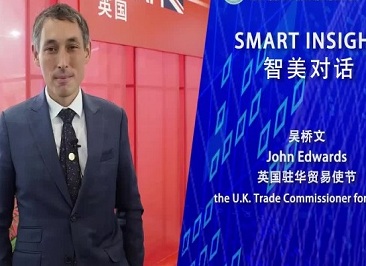..
Explainer: Whys and whats of China's unified domestic market
Updated: 2022-05-16
China Daily
Consumers check out Huawei's latest 5G smartphone models at a store in Chongqing in April. [Photo/CHINA DAILY]

Highly efficient, rules-based, fair and open, its super large potential awaits unveiling
China has released a guideline to accelerate the establishment of a unified domestic market amid efforts to build a high-standard market system and promote high-quality development.
Such a market is a scarce resource in today's world, said an official with the National Development and Reform Commission. With a population of over 1.4 billion and a middle-income group of more than 400 million, China's super large-scale market is unique in the world.
China defines a unified domestic market as highly efficient, rules-based, fair and open. It will remove local protectionism, market segmentation, or impediments restricting economic circulation, thus facilitating the smooth flow of products and resources on a larger scale.
Why is China accelerating the establishment of such a market? Here is what you need to know:
What is a unified domestic market all about?
China wants an integrated market unified by the same system and rules, ensuring high-standard connectivity of market facilities and building highly unified sub-markets of factors and resources markets and goods and services markets. Supervision should be fair and unified across the market, with unfair competition and market intervention avoided.
A market with unified policies, regulations and standards for supervision can allocate resources efficiently to maximize social welfare, said Liu Zhibiao, director of the Yangtze Industrial Economic Institute of Nanjing University.
Free from the hindrance of institutional arrangements and human factors, barriers to entry and exit will be eliminated for domestic entities, while foreign countries will benefit on a reciprocal basis, facilitating the flow of resources, factors and products at low costs, Liu added.
Setting up such a market is crucial to consolidating the smooth circulation of the domestic economic system by further stimulating the domestic market's potential, said Guo Liyan, a researcher with the Chinese Academy of Macroeconomic Research. Accordingly, domestic and international markets will be better connected, with regulations and standards more compatible and China's dual-circulation development paradigm enhanced.
Why will China speed up establishing such a market?
In recent years, notable progress has already been made to achieve a unified market and promote fair competition. However, there is still room for improvement.
Areas to receive attention include removing market segmentation and local protectionism, optimizing the factors and resources markets, and goods and services markets, unifying supervision rules and standards, and improving technological innovations and industrial upgrades.
Accelerating the construction of a unified domestic market helps stabilize market expectations and promote healthy economic development.
Improved supply quality will stimulate market demand, and a better market environment will lead to an increase in consumption potential. Circulation space will be expanded by removing barriers, and a more transparent business environment will be created through fair and just supervision.
Instead of promoting a closed domestic cycle, the unified domestic market helps domestic and international cycles reinforce each other by making effective use of global factors and market resources and better connecting the domestic market with the international market.
What changes will it bring to enterprises and consumers?
The guideline includes plans covering six areas, including market regulation and supervision, the submarkets of factors and resources and goods and services, and measures against unfair competition and market intervention.
China will strengthen the unity of basic market institutions in property rights protection, market entry, fair competition and social credit.
The property rights of enterprises will be better protected along with the personal and property safety of entrepreneurs. It will treat all market entities equally and strictly forbid the issuance of local negative lists for market access.
Efforts will be made to promote high-level connectivity of market facilities by upgrading the circulation network, smoothing information exchanges, and optimizing trading platforms to improve efficiency.
China will optimize the layout of commercial and trade circulation infrastructure and promote the integration of online and offline development. It will also support the building of digital third-party logistics delivery platforms and cultivate a batch of digital platform and supply chain enterprises with global influence.
Measures will be taken to construct unified factors and resource markets. Unified land and labor markets in urban and rural areas will be optimized, while unified markets will be created for capital, technology and data, energy and ecology.
High-level integration of markets for goods and services will also be shored up, with a focus on areas of concern to the public and market entities.
Standards will be optimized for modern distribution, big data, artificial intelligence, blockchain, 5G, the internet of things and energy storage. A list for consumer protection will be released covering housing, education and training, medical and healthcare, and elderly and child care.
More work will also be done on antimonopoly review systems in order to determine monopolistic behavior. The country will prevent platform enterprises from utilizing data, algorithms and other technical means to hinder competition and further crackdown on unfair competition in new business forms such as platforms and sharing economy.
China will also promptly review and abolish policies preventing the formation of a unified market and fair competition, such as local protectionism, market segmentation and designated trading, and comprehensively review preferential policies discriminating against foreign-invested or non-local enterprises.
Video

UK trade commissioner for China praised Chongqing as a burgeoning center in intelligent manufacturing.





